Because the business environment is evolving rapidly, companies are starting to realize how much effective workforce management really matters. Nowadays, companies need advanced tools to make hiring easier, support professional advancement, and lift performance across all teams. These days, talent management tools are crucial for firms to get, build, and keep the best people while leading in their industry.
Human resources teams in 2025 will need to cope with new norms such as remote working, a larger range of generations in the workforce, and new technology changing how we work. Those who use advanced management tools are well-prepared to handle these difficulties, forming strong structures for team involvement, upgrading skills, and company growth. Using these comprehensive platforms means there are no more dividing silos, since they manage employee data at every stage of the lifecycle efficiently.
What are Talent Management Tools?
Talent management tools are software systems meant to enhance every part of the human capital management process in a company. They incorporate many aspects, for example, automatic talent finding, overseeing how well individuals perform, providing learning and improving skills, preparing the next generation of leaders, and measuring employee engagement. HR professionals can use modern talent management tools to handle many aspects of recruiting, training, and planning for the retirement of their workforce.
These digital systems have expanded past the original HR systems by using artificial intelligence, machine learning, and predictive analytics to offer a clearer look into workforce changes. New management tools are easy to use, can be accessed from anywhere using a mobile device, and link easily into other business tools. They help companies build data-based plans for hiring, developing, and retaining staff while meeting the requirements set by the law and their industry.
Why Do We Need Talent Management Tools?
Efficiency:
Having streamlined processes frees HR from many routine paperwork and data entry jobs, letting them concentrate on big-picture strategies.
Analytics:
Using advanced reports, it is possible to get useful insights about staff changes, performance results, and employee skills, which support data-based development in the organization.
Compliance:
Using automated tools to document and watch over processes ensures compliance with employment laws, rules from the industry, and internal policies, which also reduces the chance of legal issues.
Engagement:
Using interactive platforms helps teams communicate effectively, provide and receive feedback, and appreciate their efforts, which increases both happiness and productivity at work.
Scalability:
When a company grows, cloud solutions make it possible to hire more workers and expand activities without buying lots of new hardware or performing major updates.
Integration:
Connectivity to other business systems helps keep workflows uniform, prevents data from being separated, and lets everyone see the overall performance of the organization in each department.
Comparison Table for Talent Management Tools
| Tool | Rating | Website URL |
| Deel | 4.8/5 | deel.com |
| Greenhouse | 4.7/5 | greenhouse.io |
| ClearCompany | 4.6/5 | clearcompany.com |
| RemoFirst | 4.5/5 | remofirst.com |
| PerformYard | 4.4/5 | performyard.com |
| SixFifty Employment Docs | 4.3/5 | sixfifty.com |
| GoCo | 4.2/5 | goco.com |
| Cegid | 4.1/5 | cegid.com |
| Recruitee | 4.0/5 | recruitee.com |
| FoxHire | 3.9/5 | foxhire.com |
Top 10 Talent Management Tools
1. Deel
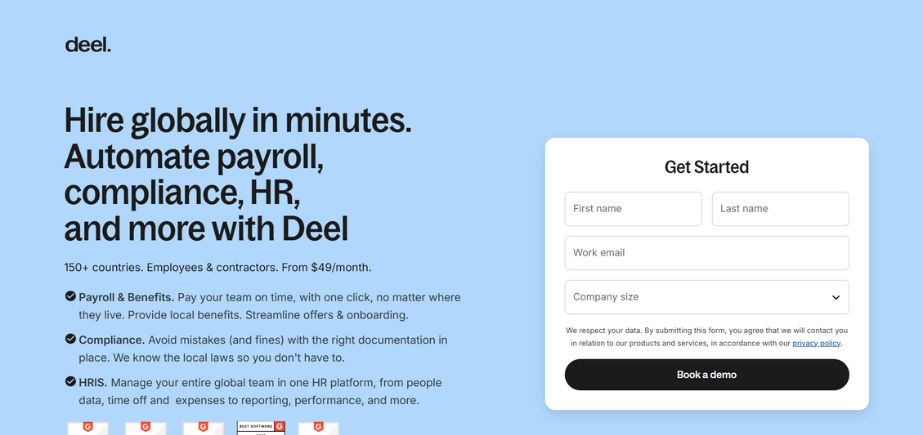
Type: Global Workforce Management Platform
Rating: 4.8/5
Website URL: https://www.deel.com/
With Deel, organizations can easily manage international employees in more than 150 countries in an innovative way. It simplifies tough international work rules and offers smooth ways to look after employees and contractors from different countries, helping to remove the obstacles to expanding globally. Thanks to the system, compliance is easy, payroll tasks are automated, and managing taxes requires less effort.
The platform is strong because it can deal with many different work rules from various countries and still keep users’ experiences alike. Deel uses modern technology to simplify the process of onboarding, creating contracts, and sending payments, which is helpful for businesses with employees working remotely. Users are able to customize the solution as needed to meet their business rules and obey laws in their geographic locations.
Key Features:
- Global payroll automation
- Compliance management system
- Contract generation tools
- Multi-currency payment processing
- Immigration support services
Pros:
- Extensive country coverage
- Automated compliance handling
- Intuitive user interface
Cons:
- Premium pricing structure
- Complex initial setup
- Limited customization options
Pricing: Custom pricing based on organizational requirements and employee count
2. Greenhouse
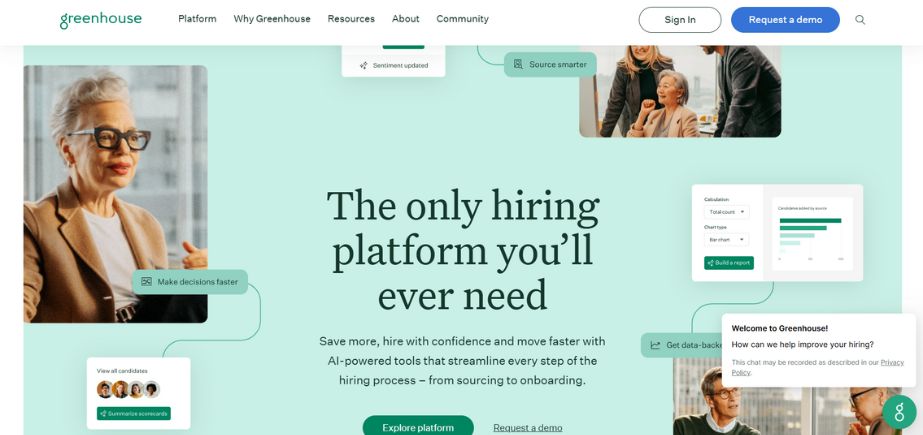
Type: Applicant Tracking and Recruiting Platform
Rating: 4.7/5
Website URL: https://www.greenhouse.com/
Greenhouse is one of the top solutions for hiring teams that value bringing people together and using clear interview procedures. It brings new changes to recruitment by using data to eliminate biases and enhance the quality of job candidates. Tracing the journey of candidates is possible from advertising the position to getting them on board.
Data and insights from the platform’s analytics engine allow companies to observe recruitment performance, find the causes of any problems, and refine strategies for better hiring outcomes. Greenhouse works well with several outside platforms, forming integrated hiring systems that make workflow and team communication easier. By encouraging a set interview method and team evaluation, the solution makes sure everyone in the company is using the same approach to assess candidates.
Key Features:
- Structured interview scheduling
- Collaborative evaluation tools
- Advanced recruiting analytics
- Candidate experience optimization
- Integration marketplace access
Pros:
- Comprehensive recruiting features
- Strong analytics capabilities
- Excellent third-party greenhouse integrations
Cons:
- Recruiting-focused limitations
- Steep learning curve
- Higher cost structure
Pricing: Custom pricing available upon request
3. ClearCompany
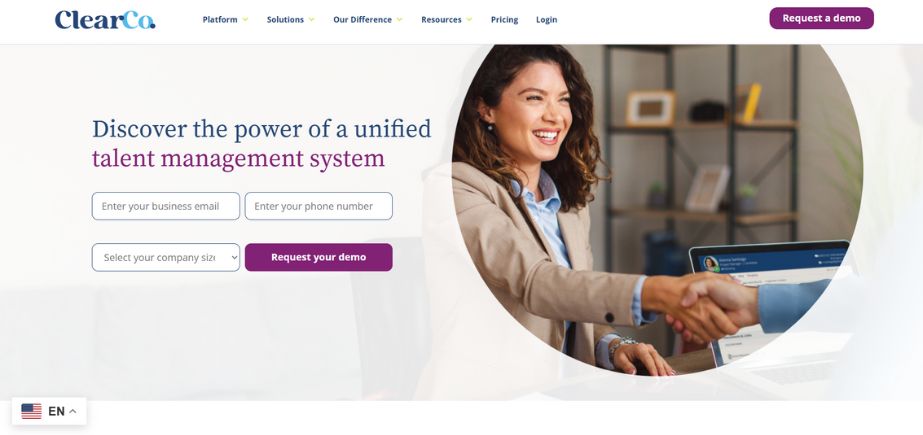
Type: Full-Lifecycle Talent Management Suite
Rating: 4.6/5
Website URL: https://www.clearcompany.com/
ClearCompany provides a full talent management system that handles hiring, developing, and retaining employees until they retire. Employers are able to make good decisions about managing and developing their workforce because the platform offers thorough analytics. It combines different HR operations into one platform and reduces the use of different systems, which improves how the company operates.
Its usefulness comes from showing managers the overall condition of the talent pool, how well employees perform, and opportunities for the company to improve. The platform lets you set up goals and follow their progress, which supports individual goals in meeting the company’s broader goals. With strong learning tools, succession planning programs, and surveys on employee engagement, the solution supports a complete development program for employees.
Key Features:
- Complete lifecycle management
- Advanced analytics dashboard
- Goal alignment tools
- Learning management system
- Succession planning module
Pros:
- Comprehensive feature coverage
- Strong analytical capabilities
- Integrated platform approach
Cons:
- Complex implementation process
- Overwhelming feature density
- Resource-intensive setup requirements
Pricing: Custom pricing based on organizational needs and user count
4. RemoFirst
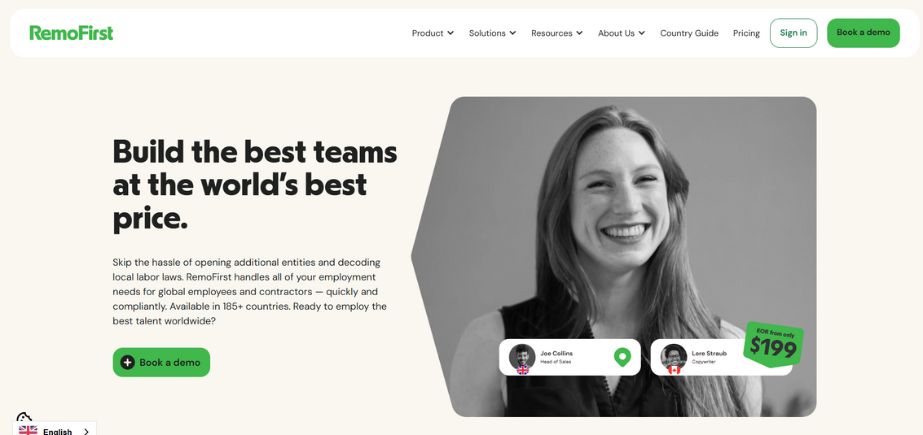
Type: Remote Workforce Management Platform
Rating: 4.5/5
Website URL: https://www.remofirst.com/
Managing both global and remote teams is a specialty of RemoFirst, and the platform offers businesses complete solutions for managing workers from a distance. This tool solves the problems related to remote work by supplying members of remote teams with communication features, tools for checking performance, and features to keep up with compliance standards. The system makes it easy to monitor work done by remote employees and preserves their work-life balance at the same time.
TeamTime uses time tracking, links with project management software, and cloud-hosted collaboration tools to make sure that no matter the location, teams can be more productive. Both RemoFirst employees and independent contractors are supported by one standard management interface. With the solution, managers can get detailed information about how teams work remotely, which helps them optimize the way remote work is done.
Key Features:
- Remote team management
- Global compliance tools
- Virtual collaboration features
- Flexible employment options
- Distributed workforce analytics
Pros:
- Remote-specific functionality
- Competitive pricing structure
- User-friendly interface
Cons:
- Limited offline capabilities
- Newer market presence
- Fewer integration options
Pricing: $25 to $199 per user per month, depending on selected features
Suggested Blog:
5. PerformYard
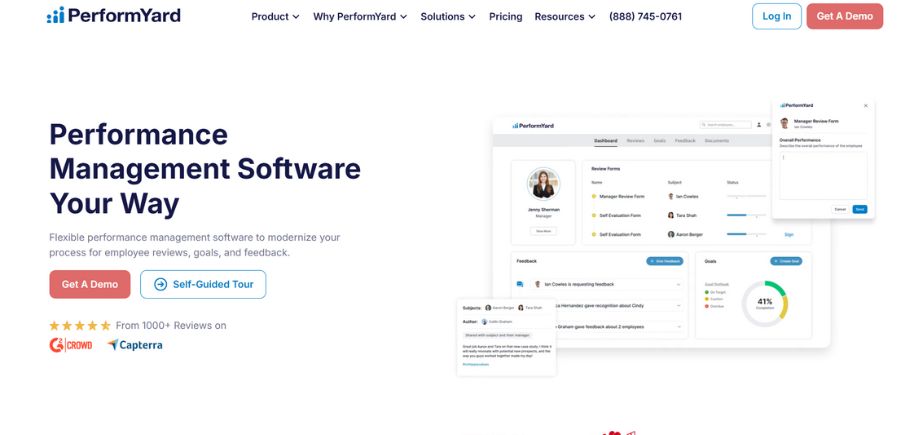
Type: Performance Management and Development Platform
Rating: 4.4/5
Website URL: https://www.performyard.com/
What sets PerformYard apart is its combination of talent management and strong performance management systems, which help companies manage employee growth and success together. The platform encourages managers to give regular reviews, set clear goals, and assess people’s skills to promote lasting growth. The system allows for flexible review periods, lets you set tailored performance criteria, and allows for feedback from many sources, supporting different types of organizations.
It is particularly strong because it allows teams to manage their performance openly and promotes ongoing chats between staff and management. The platform comes with goal-setting functions that align objectives set for the company with targets each employee should reach. It gives users valuable information about performance, necessary development, and who could replace important staff over time.
Key Features:
- Continuous feedback systems
- Customizable review cycles
- Goal cascading tools
- Multi-source feedback options
- Performance analytics dashboard
Pros:
- Affordable pricing structure
- Flexible review processes
- Strong feedback mechanisms
Cons:
- Limited recruitment features
- Basic reporting capabilities
- Fewer third-party integrations
Pricing: $5 to $10 per user per month, depending on selected plan
6. SixFifty Employment Docs
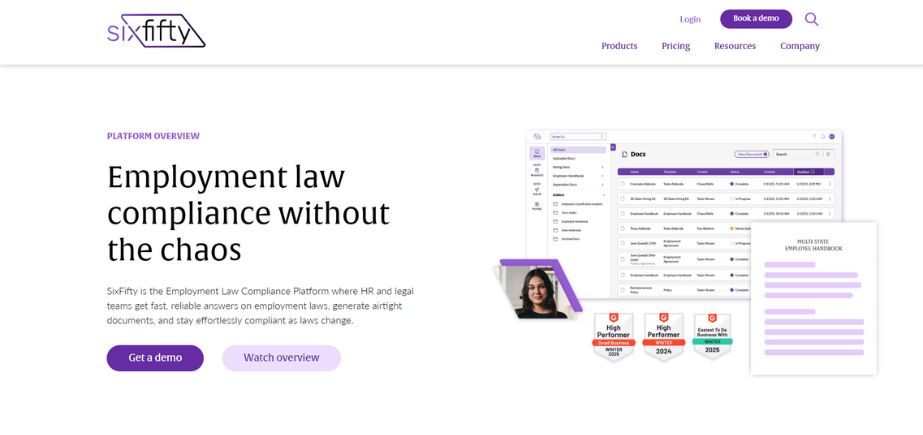
Type: Employment Documentation Management System
Rating: 4.3/5
Website URL: https://www.sixfifty.com/
SixFifty Employment Docs helps businesses by taking care of hiring documents and related employment paperwork, ensuring documents are created, properly stored, and compliance is met. With this platform, companies can easily automate the approval of documents, use consistent styles, and follow the regulations in different countries. There are plenty of pre-made templates, AI-based document generation tools, and safe data storage options in the system that improve administrative processes.
Because it handles employment documentation so well, the platform is especially important for companies facing tough regulatory rules or hiring lots of people. SixFifty makes it easy to check for compliance, manage changes, and track all actions, which minimizes risks and maintains standardized ways of recording information. Because it integrates with existing HR systems, the solution saves time by eliminating duplicate data entry and enhancing workflow efficiency.
Key Features:
- Automated document generation
- Compliance tracking systems
- Template library access
- Secure document storage
- Audit trail capabilities
Pros:
- Specialized document focus
- Strong compliance features
- Automated workflow capabilities
Cons:
- Limited scope functionality
- Narrow use case
- Integration challenges
Pricing: Custom pricing available upon request
7. GoCo
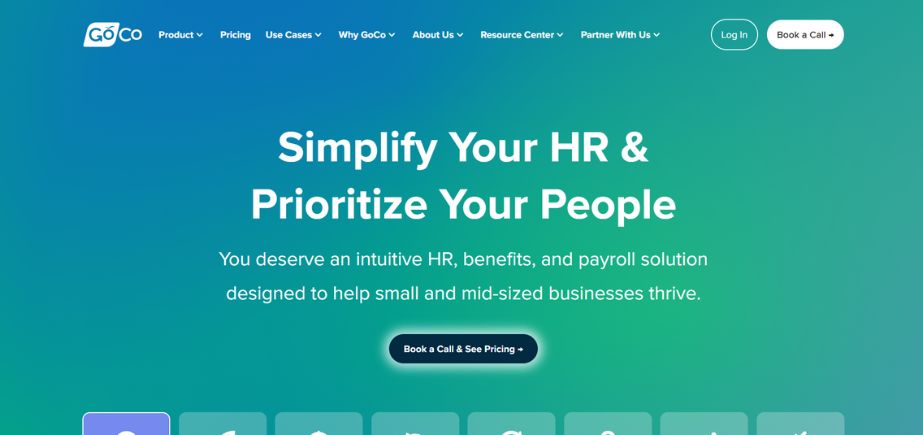
Type: HR and Benefits Administration Platform
Rating: 4.2/5
Website URL: https://www.goco.io/
With GoCo, you can manage HR and benefits, and its high points are customizable performance assessments and easy self-serve options for employees. Traditional HR functions are merged with advanced design to provide interfaces that motivate employees and minimize the workload for admins. Users can set up the system to meet the needs of any kind of organization and its unique management styles.
Because the platform is so customizable, companies can design the process of reviews, managing benefits, and communicating with employees to match their business needs. By integrating payroll processing, time tracking, and reporting, GoCo helps make human resources processes easier and more coordinated. The solution is designed to let employees access information and do their work using different mobile devices anywhere.
Key Features:
- Configurable performance reviews
- Benefits administration tools
- Employee self-service portal
- Integrated payroll processing
- Mobile accessibility options
Pros:
- Highly configurable interface
- Comprehensive HR coverage
- User-friendly design
Cons:
- Limited advanced analytics
- Smaller vendor presence
- Fewer specialized features
Pricing: Custom pricing available upon request
8. Cegid
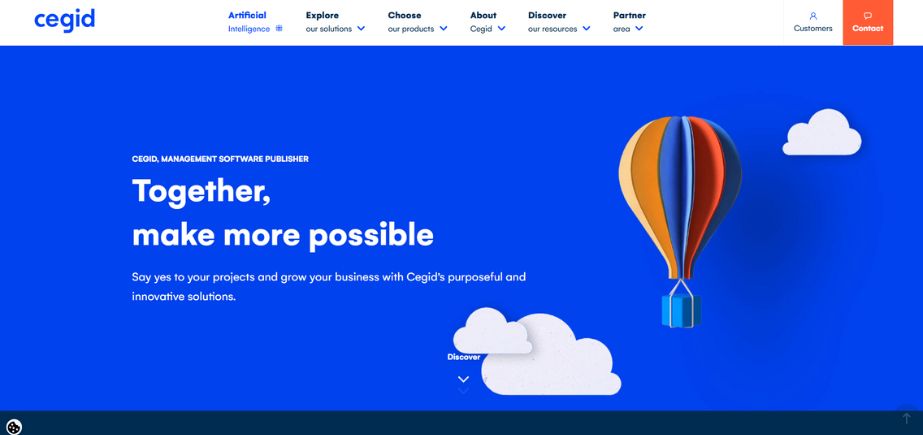
Type: Collaborative Recruitment and Talent Platform
Rating: 4.1/5
Website URL: https://www.cegid.com/global/
Cegid mainly helps organizations with recruiting by fostering collaboration among teams and managing all aspects of talent management. By using this platform, recruiters can take charge of complicated jobs, allow staff to cooperate, and make sure all parts of the organization follow the same evaluation rules. There are many customization features in the system, so it works well for all kinds of industries and individual company processes.
It helps teams work together during talent management with shared tools, integration for clear communication, and detailed reporting on candidates, so that everyone involved is always informed. Cegid supplies analytics tools that show performance in recruitment, teamwork, and talent, allowing HR to make better decisions on strategic workforce planning.
Key Features:
- Collaborative recruitment tools
- Integrated workflow management
- Advanced analytics capabilities
- Customizable evaluation processes
- Stakeholder communication features
Pros:
- Strong collaboration features
- Comprehensive customization options
- Robust analytics tools
Cons:
- Complex learning curve
- Higher implementation costs
- Limited market presence
Pricing: Custom pricing available upon request
9. Recruitee
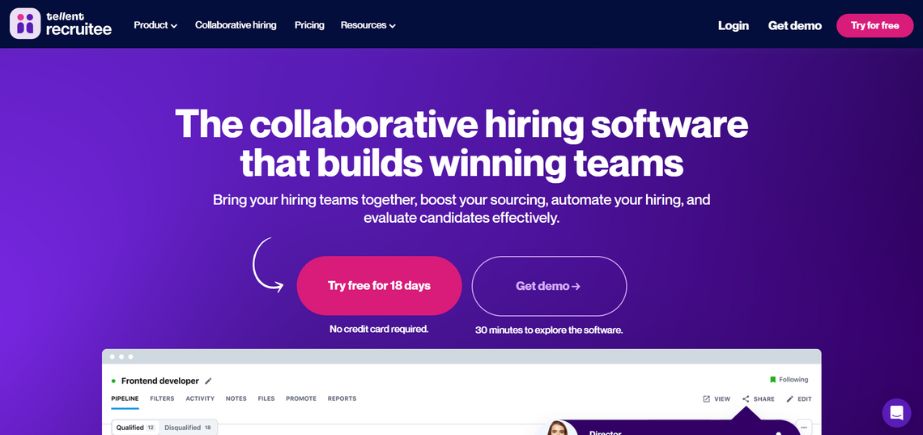
Type: Recruitment and Applicant Tracking Platform
Rating: 4.0/5
Website URL: https://recruitee.com/
Recruitee provides features for recruitment and tracking candidates, and it stands out with strong Android and iOS mobile development skills. Its user-friendly interfaces guide users through complex recruitment processes, keeping standards and tracking on the highest level. The system offers excellent mobile support for current ways of recruiting and what job seekers expect.
Because the platform is built for mobile devices, recruiters can handle their hiring tasks more quickly and effectively from all sorts of locations. You can find social media recruitment tools, set up automation for reviewing applicants, and get comprehensive reports in Recruitee, which help to optimize your recruitment efficiency. The product helps teams match hiring steps to different processes and keep the evaluation process consistent.
Key Features:
- Mobile-first platform design
- Social media integration
- Automated candidate screening
- Customizable recruitment workflows
- Comprehensive reporting tools
Pros:
- Excellent mobile functionality
- Intuitive user interface
- Competitive pricing structure
Cons:
- Limited performance management
- Fewer enterprise features
- Basic integration options
Pricing: Starting at $269 per month with an 18-day free trial available
10. FoxHire
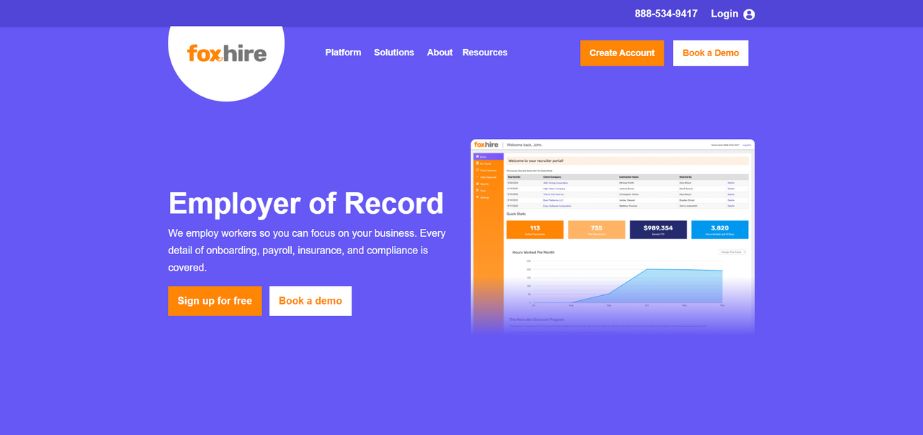
Type: Global Talent Onboarding Platform
Rating: 3.9/5
Website URL: https://www.foxhire.com/
FoxHire is dedicated to bringing on global staff, offering everything required for their successful integration and compliance into a company. It addresses the unique needs of global workers by automating hiring processes, monitoring compliance, and managing everything needed for global teams. It is good at making global employment requirements simple without altering the way people are onboarded.
Because it supports global onboarding effectively, the platform is well-suited for companies expanding internationally or managing staff working in multiple locations. It helps new employees by offering automation for checking rules, support for multiple languages, and culturally aware onboarding. It includes strong tracking abilities to ensure certain onboarding meets set standards without clashing with local rules and customs.
Key Features:
- Global onboarding automation
- Compliance tracking systems
- Multi-language support options
- Cultural sensitivity tools
- Comprehensive documentation management
Pros:
- Specialized global focus
- Automated compliance features
- Multi-language capabilities
Cons:
- Limited post-onboarding features
- Narrow functionality scope
- Smaller vendor presence
Pricing: Custom pricing available upon request
Conclusion
Because of new technology, changing people at work, and changing what businesses value, the field of management tools is constantly developing. Firms that use advanced tools tend to perform well and maintain a leading position among competitors by attracting top employees, developing existing staff, and sustaining strong performance through all divisions.
Before using talent management tools, it is necessary to think about the organization’s needs, its budget, and plans. The reviewed platforms offer different ways to handle workforce management, each with its own set of skills and features that aim at specific business challenges. Taking into account their situation and requirements, such as company size, what is needed from their industry, their locations, and present technology, organizations can decide which solutions to employ for their talent management.
Frequently Asked Questions
Q1: What are the primary benefits of implementing talent management tools in organizations?
Some of the many advantages of management tools are easy methods to recruit, better employee involvement, data to help decisions, better compliance, and improved organizational functions. They help organizations establish similar processes in different sections and also give information on workforce trends and how the company is performing.
Q2: How do talent management tools improve employee retention rates?
With these platforms, employees remember what they learn because they offer set paths for growth, regular updates, recognition programs, and personalized learning. In places where communication is transparent and workers know how they are doing, they value and engage with their personal development.
Q3: What factors should organizations consider when selecting talent management tools?
Organizational size, availability of funds, which features are required, how well the software fits with your existing systems, future growth possibilities, support provided by the vendor, and long-term concerns should all be kept in mind. Companies should check how good the user experience is, if the system works on mobile devices, and if it matches the rules for their line of business.
Q4: Can small businesses benefit from talent management tools?
Absolutely. Several talent management software options give small businesses the flexibility to use them at a suitable prices. Through small organizations, these platforms ensure that recruiting is professional and fair, and they help with evaluating job performance and developing workers.
Q5: How do talent management tools ensure data security and privacy compliance?
Well-known talent management systems are safe due to data encryption, restricting access, performing audits often, and being compliant with laws such as GDPR and CCPA. Every organization should always examine a provider’s certifications and policies on privacy to make sure data is managed securely.

